If you were hiking in the mountains one summer day and you stumbled upon a still supervised by the none other than the sheriff himself, at the height of Prohibition no less, what would you do? Sneak away? Try to find someone to report to when you got back to town? Helen Paul and her friends found themselves in this predicament one day in 1920 while wandering the woods.
“High school was a period full of stimulating learning and social experience,” Helen wrote of her childhood. In a short memoir, she described a close-knit family – several older siblings who watched out for her and a supportive and loving mother and father. She settled into a clique and excelled in her classes when she reached high school, eventually assuming several leadership roles in student government and choir.
One day, having joined a group of friends for a hike, Helen and the others “saw smoke through the trees and left the path to investigate.” During Prohibition, many mountain areas, she acknowledged, were home to stills, where alcohol was made in “boot-leg whiskey outlets [which] supplied the town.” The group’s investigation led them to a stream in which “barrels of mash were cooling…close to a newly made road that we knew must lead back to the town.” The boys in the group tipped over some of the barrels before they all continued down the road.

Credit: Park City Historical Society and Museum, Anderson Digital Collection
Emerging from the woods, they walked into a clearing and came upon a shocking sight: “we recognized [the property] as the ranch of the county sheriff. Near the house was a wagon being loaded with barrels and supervised by the sheriff himself.” Though Helen and her friends were surprised, the bootleggers were even more so, for, as Helen said, “no one expected a bunch of juveniles to appear down the mountain pass, for the front gate was guarded by two deputies with rifles.” But down the mountain those kids appeared, and walked straight out the gate past the deputies.
Imagine the scene for yourselves: a group of young teenagers, likely no older than seniors in high school (Helen herself was only a freshman at the time), stumble upon a large illegal operation. Did they wink at the deputies as they passed through the gate? Smile innocently? Speak to or acknowledge the bootleggers at all? Helen didn’t say in her story. But she did say that they all agreed, as they walked away, that “we would guard the knowledge of the still, tell absolutely no one, and see how it would work to our advantage.” And in the end, it worked quite well. “This form of teen-age blackmail really paid off,” Helen recalled. “Every time the sheriff met one or a group of us on Main Street he greeted us pleasantly and offered a banana split or some delectable treat at the ice cream parlor.”